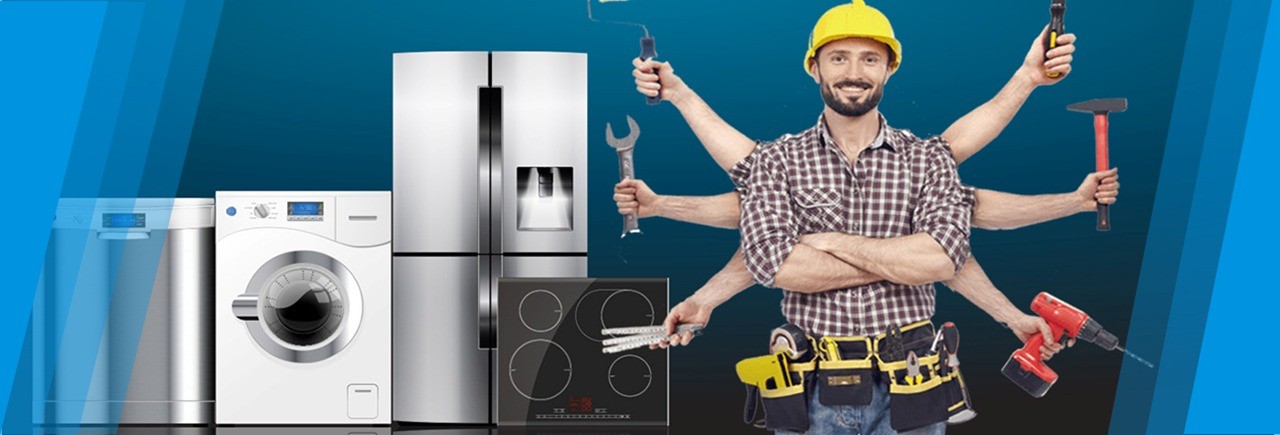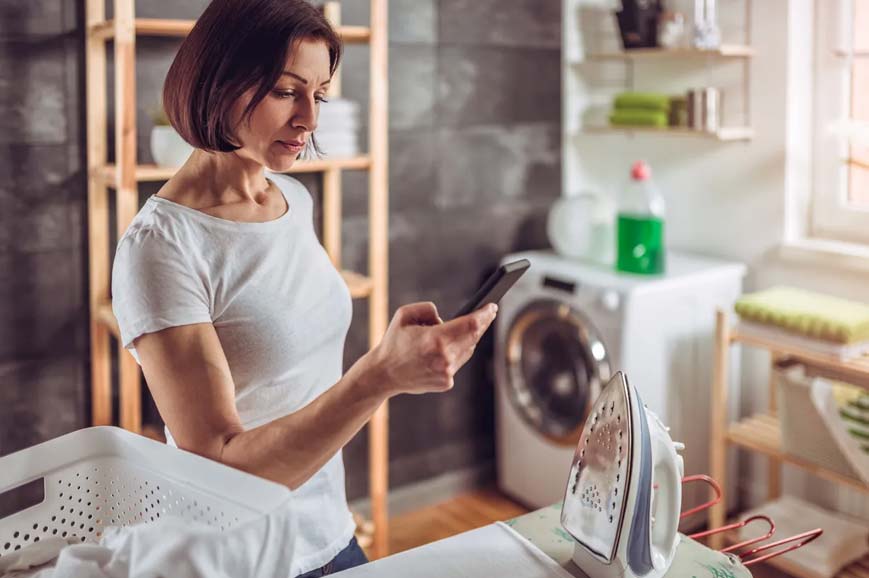How to Tackle Common Laundry Issues – Washer dryer repair service Dependable Refrigeration
How to Tackle Common Laundry Issues – Washer dryer repair service Dependable Refrigeration
Blog Article
The Ultimate Guide to Understanding Device Repair in the house
When your fridge quits cooling down or your stove declines to warm, it can feel overwhelming. Understanding appliance repair work at home can save you time and cash. You'll learn to acknowledge symptoms, utilize crucial tools, and comply with a systematic troubleshooting process. But before you begin, there are essential safety precautions you require to think about. What are one of the most typical issues, and exactly how can you fix them? Let's check out the fundamentals.
Usual Appliance Troubles and Their Signs and symptoms
When your appliances begin breaking down, it's vital to identify the signs early on. Overlooking them can lead to larger concerns and pricey repair services. As an example, if your fridge isn't cooling down properly, you might discover warm areas or condensation forming. This can show a stopping working compressor or an obstructed vent.Your dish washer may show problems through dirty meals or uncommon noises during cycles. If you hear grinding or clanking, it's time to investigate.A washing equipment that won't rotate or drain can leave you with soaked washing, recommending a stopped up drain or a malfunctioning pump.Lastly, if your oven's temperature seems off or it takes for life to preheat, you could be handling a damaged thermostat. By remaining alert to these symptoms, you can deal with issues prior to they rise right into major repairs.
Important Devices for Device Fixing
When you're tackling home appliance fixings in your home, having the right devices is vital. Standard hand tools like screwdrivers and pliers will certainly assist you dismantle and take care of numerous appliances, while electric screening tools guarantee you're functioning safely with circuitry. Allow's review what you require to get started on your repair work trip.
Standard Hand Devices
Having the right devices is vital for effective device fixing at home. Start with a dependable screwdriver set, consisting of both flathead and Phillips types, as screws prevail in appliance assembly. Pliers are likewise important; they aid with gripping, turning, and cutting cords or small components. A pair of needle-nose pliers can get to limited areas easily. You'll need an excellent adjustable wrench for tightening or loosening up nuts and screws. An energy knife is useful for puncturing product packaging or insulation. Ultimately, don't fail to remember a sturdy workbench or surface to securely organize your devices and parts. With these basic hand devices, you'll be well-prepared to take on most home appliance repair services that come your means.
Electrical Screening Instruments
Together with basic hand tools, electric testing devices play a necessary duty in appliance fixing. These devices help you detect electric concerns and assurance appliances function securely. A multimeter is crucial; it gauges voltage, current, and resistance, allowing you to determine issues rapidly. A non-contact voltage tester is one more must-have, allowing you identify online cords without making direct contact, improving your safety. Secure meters are excellent for measuring existing circulation in cables without detaching them, conserving you time and initiative. Additionally, circuit testers can swiftly examine if outlets are working properly. By utilizing these gadgets, you'll enhance your troubleshooting procedure and enhance your repair work skills, making device maintenance a whole lot easier.
Step-by-Step Overview to Diagnosing Appliance Issues
When your device acts up, it can be irritating, but detecting the issue doesn't need to be frustrating. You'll learn to recognize common problems and apply efficient fixing techniques. Allow's walk via the steps to get your device back in working order.
Usual Home Appliance Troubles

Repairing Strategies Clarified

Fixing Major Kitchen Area Devices: A Closer Look
Have you ever asked yourself just how to deal with common problems with your cooking area devices? Fixing major kitchen area home appliances like refrigerators, stoves, and dishwashing machines can be much easier than you assume. Begin by identifying the trouble-- whether it's a refrigerator not cooling down or a stove that won't warm. Frequently, a basic reset or examining the power source can resolve the issue.For refrigerators, tidy the condenser coils and examine the door seals. If your oven's not heating, check the heating aspect and thermostat. Dishwashers might simply require a clean filter or a reset to get them back at work. Constantly unplug the home appliance before diving right into repair services to ensure your safety.Don' t neglect to speak with the user handbook for particular fixing pointers associated to your model. With a little bit of patience and the right devices, you can with confidence deal with device fixings and conserve cash while doing so!

Troubleshooting Laundry Equipments: Tips and Techniques
When your washing devices start breaking down, it can really feel overwhelming, yet fixing them doesn't need to be a trouble. Start by checking the power supply. Validate the appliance is connected in and the outlet is functioning. Next off, evaluate the door or cover button; a malfunctioning button can avoid the equipment from operating.For washers, if it's not spinning, look for out of balance tons. Redistributing the clothes may solve the concern. If your clothes dryer isn't home heating, read more clean the dust filter and check the air vent for blockages.Listen for uncommon sounds; they can indicate a problem. If your device is dripping, check the pipes for fractures or loose links. Document any mistake codes displayed on digital displays, as they can assist you in identifying the concern. Ultimately, seek advice from the customer manual for details repairing pointers related to your design.
Security Precautions to Take During Fixes
Prior to you start any type of home appliance repairs, it's necessary to prioritize security to stop crashes or injuries. Unplug the appliance or transform off the circuit breaker to assure no power reaches it while you work. Use shielded devices to decrease the threat of electrical shock. Use security goggles and handwear covers to shield on your own from sharp edges or debris (Dependable Refrigeration & Appliance Repair Service Washer repair near me).Make particular your work space is neat and well-lit, so you can see what you're doing. Keep children and pet dogs far from the location to avoid disturbances and possible hazards. If you're handling gas home appliances, be additional careful; check for leakages prior to proceeding.Take your time, and do not hurry through repairs. If you really feel unclear concerning any kind of step, it's far better to stop and research study than to think. Adhering to these preventative measures will help develop a much safer atmosphere for your DIY appliance repair service project
When to Call a Specialist for Help
Just how do you know if it's time to employ a professional for appliance repair work? If you've attempted fundamental troubleshooting without success, it's a clear indication. If your appliance still will not begin or reveals unusual noises after resetting it, do not hesitate to seek professional help.When you observe leaks, smoke, or burning scents, focus on safety and security and call a professional promptly. These issues can lead to even more considerable damage or position risks to your home.Also, if your appliance is under warranty, contacting an expert is frequently the most effective path. They can assure that repair services will not nullify your guarantee, saving you cash in the long run.Finally, if you're not sure or awkward with intricate repair services, it's important to leave it to the specialists. Keep in mind, dealing with complicated concerns without the best know-how can lead to costly errors. Trust a professional when in uncertainty!
Frequently Asked Concerns
Exactly How Can I Avoid Home Appliance Issues in the Future?
To protect against appliance issues in the future, you ought to do regular maintenance, check for deterioration, tidy filters, and stay clear of overloading. Remaining aggressive will certainly help prolong their life expectancy and maintain them running efficiently.
What Are the A Lot Of Typical DIY Home Appliance Repair Mistakes?
You might neglect security preventative measures, avoid repairing steps, or make use of inaccurate devices when trying DIY device repairs. Hurrying the process or ignoring supplier standards can result in even more significant problems and pricey blunders. Remain client and informed!
Just how Do I Know if a Part Demands Replacement?
You can inform if a component needs substitute by inspecting for unusual noises, leaks, or irregular efficiency. If the home appliance has a hard time to operate properly or shows noticeable damage, it's most likely time for a replacement.
Can I Use Generic Parts for Home Appliance Repairs?
Yes, you can use common parts for home appliance repairs, but establish they're suitable - Dryer repair Oro Valley Dependable Refrigeration & Appliance Repair Service. Common components might save you money, but they might impact performance or long life, so consider your options thoroughly prior to making a decision
What Warranties Cover Device Repair Works?
The majority of appliance guarantees cover fixings for manufacturing flaws, yet they often omit damage from abuse. Examine your service warranty terms very carefully, as some may need making use of certified service technicians and original parts for coverage to remain legitimate.
Report this page